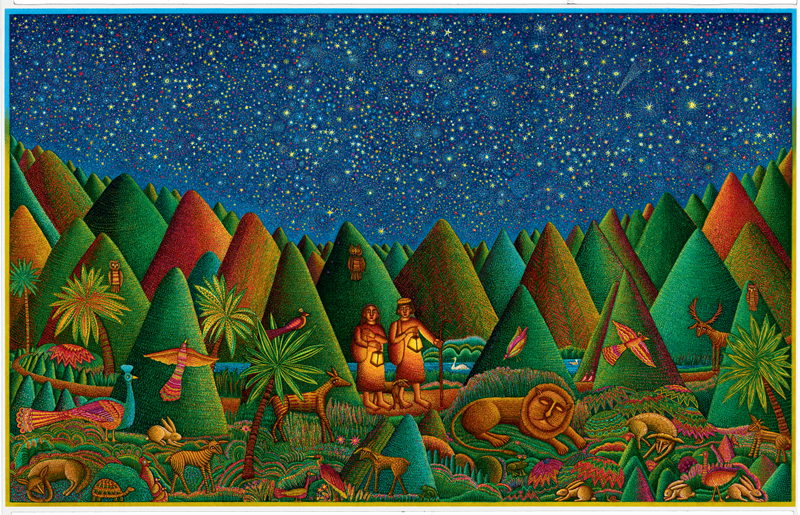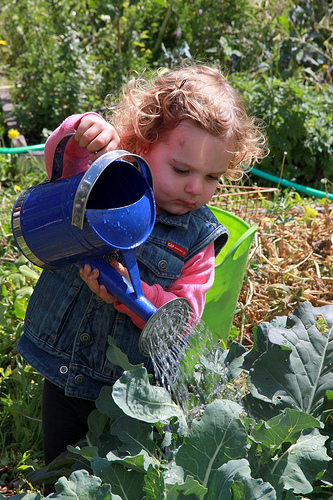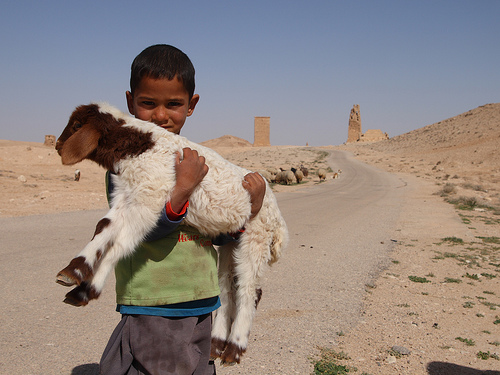Revised Common Lectionary Reflection, Fourth Sunday of Easter, Year B

April 25, 2021
Lessons: Acts 4:5-12; Psalm 23; 1 John 3:16-24; John 10:11-18
Theme: God’s faithful and generous people experience God’s love in Christ, and they understand that same love extends to every atom and molecule of creation.
Key Scripture: The LORD is my shepherd, I shall not want. – Psalm 23:1
This week’s lessons offer several rich approaches for preaching and teaching. (Note: Please check our archives to explore some of these other ways.) You might choose celebrate Good Shepherd Sunday as indicated in many liturgical circles. Why not consider the power of love to change the world? Either approach is great way to go.
This year, however, I’m feeling the need to do something just a little different. Sunday can also be celebrated as Creation Sunday, and that seems a truly timely celebration right now. Why, you might ask, would you even go there? Climate change is one of those polarizing issues, and the last thing we need is to move further apart.
Of course it’s polarizing! All the important issues of our day have that possible outcome, but it doesn’t mean that we should shy away from discussing them. One must be keenly aware of context and capacity for change. One can nudge, but pushing rarely results in the desired effect. Figure out what environmental concepts resonate across your congregation and keep your focus there. Perhaps foci on clean water or soil conservation? Maybe reforestation or global warming would be an appropriate springboard in your context.

Why the 23rd Psalm for Creation Sunday? Why not look at Genesis or any other number of potential lessons? The easy answer is “why not”? It’s what the lectionary gives us for this Sunday, and the Holy Spirit does tend to provide a way forward. The key to using this psalm to celebrate Creation Sunday is to invite people to explore it afresh. Instead of viewing it as simply a few verses of comfort or a venerable funeral scripture selection, why not see it in a broader sense? View it in the context of the good shepherd’s tender loving care for all of creation, not just human beings. Could this psalm, then, be a model for Christ followers when it comes to how we steward and protect creation? This possibility is clear in poem’s structure. Let’s take a look.
Verse One: “The LORD is my shepherd, I shall not want.” When all creation turns to the good shepherd, there is no need to worry or want. I am reminded of Luke 12:27 wherein the author considers the lilies of the field. God provides all that is needed for life to thrive in a well-tended biome. Problems begin when we decide to play God.
Verse Two: “He makes me lie down in green pastures; he leads me beside still waters.” Both soil and water matter to the good shepherd, as do his sheep. Overgrazing leads to soil depletion, and water must be carefully stewarded for cleanliness and safety. How do we humans support our good shepherd or work against him in care of soil and water, of animals and habitat? Are we “workaholics” who must be told to lie down and rest, to take good care of ourselves?
Verse Three: “he restores my soul. He leads me in right paths for his name’s sake.” Stewarding the land, farming and ranching are among the riskiest endeavors in which humans regularly engage. Farming can be both one of the most rewarding ventures and one of the most soul-sucking. Verse three reminds us that Jesus is there when our souls are at their most downtrodden. Our restoration is in Christ and Christ alone. Plus, we don’t have to seek external guidance because Jesus gives us an instruction manual within the four gospels for how to live as his disciples. Yes, he guides us in right paths; of that we can be certain.
Verse Four: “Even through I walk through the darkest valley, I fear no evil; for you are with me; your rod and your staff—they comfort me.” Everyone messes up. All of us hit low points. The good news is that we don’t have to be afraid. The good shepherd walks with you. He will not leave you and will use the gentle tools of his trade to keep you safe. Standing up for justice can leave one feeling pretty vulnerable and unsafe. Being steeped in sin—either corporate or individual—can leave one in a dark place, too. We need our good shepherd to walk us through and keep us going, especially when it comes to creation care.

http://www.flickr.com/photos/edbrambley/3604148806/
Verse Five: “You prepare a table before me in the presence of my enemies; you anoint my head with oil; my cup overflows.” Don’t run from the opposition! Work with them. Jesus will set a table for you right in their midst. This is what’s needed. We must talk, let science speak, and respond accordingly. We can’t do that without being together. Our good shepherd will keep us as safe and healthy as possible. By anointing the heads of the sheep, the good shepherd is helping to prevent parasites and flies, sunstroke, and possibly even violence between rutting rams. When we focus on the good shepherd we have all that we need, and our wants become simpler and fewer. We humans take our place in the grand goodness of creation with overflowing cups and all that we need.
Verse Six: “Surely goodness and mercy shall follow me all the days of my life, and I shall dwell in the house of the LORD my whole life long.” What does it mean to dwell in the house of the LORD all your life? Hang out in a church building? Become a monk or nun and move into a cloistered life? No, I don’t think so. What if we looked at the house of the LORD as all of creation? After all goodness and mercy will follow us as we dwell in, with, and through all that God proclaimed good. What’s our part of the covenant? We are to steward and care for all of creation, treating it with dignity and respect since all that God created is proclaimed to be very good indeed.
In
Worship
If you plan to celebrate Creation Sunday, consider doing
something to get outside during worship, or how about blessing seeds, soil, and
water? You’ll find many excellent links on the Stewardship of Life Institute
website under the Creation Care heading. Consider having congregants plant tree
seeds and grow the seedlings that can be transplanted later.
Invite a farmer or conservationist to speak during worship or during an educational time.
With
Youth
Invite youth to discuss their fears, hopes, dreams, and questions about climate
change, global warming, plastics, recycling etc. Have a short activity planned
where youth can help you pick up recycling and trash around the church
property. If that’s not an option, find a place where they can volunteer, or
have them write letters to elected officials. Be sure to weave Psalm 23
throughout your time together
With
Children
This week’s focus verse is Psalm 23:1– The LORD is
my shepherd, I shall not want.
How many of you ever WANTED something really badly? When I was a child, I wanted a pet really badly, a pet that I could keep inside. After many visits to the pet store, we decided that a gerbil would be good. A few weeks later, on Christmas morning, that gerbil showed up under the tree, and I was smitten. But here’s the thing. Gerbils start to stink if you don’t clean them. You have to feed them and give them fresh water. It takes effort. It wasn’t too many months until the gerbil figured out how to get out of her cage, and I still have this image of my mother chasing a small rodent the hallway.
I really thought that I wanted that gerbil, but when it came right down to it, I wanted the gerbil for the wrong reasons. If I’d just followed the good shepherd and loved the outside dog we had, I wouldn’t have wanted another pet that I didn’t need. When the good shepherd tells us we shall not want, we need to listen and trust Jesus. Let’s pray:
Dear Lord (Dear Lord),
Thank you for loving us (Thank you for loving us). Thank you for being our Good Shepherd (Thank you for being our Good Shepherd) and giving us what we need (and giving us what we need). We want to be good sheep, good Christians (We want to be good sheep, good Christians) who do your will (who do your will). Help us to love your good creation, too (Help us to love your good creation, too). And let all God’s children say…AMEN!
Weekly
Stewardship Bulletin Insert
Thank you for caring for creation and for helping to keep
our church grounds looking so lovely and welcoming. We couldn’t do this work
without your support and care for God’s good creation. Thank you!
Stewardship at Home
Check out this video by evangelical Christian and climate scientist Katharine Hayhoe. She explains what the Bible says about stewardship of creation and climate change and why different Christians interpret scripture differently. Once you’ve watched it, engage in some discernment about your own feelings and concerns. Talk with family members, particularly children and teens. Why do you feel this way? Are you called to action?
Another option is to watch the documentary The Biggest Little Farm, 2018, available on HULU. Check out the preview here.
2018 Reflection: https://www.stewardshipoflife.org/2018/04/a-few-choice-words/
2015 Reflection: https://www.stewardshipoflife.org/2015/04/rambling-in-the-ruts-of-righteousness/
2012 Reflection: https://www.stewardshipoflife.org/2012/04/whats-the-catch/
Note: Reprint rights granted to congregations and other church organizations for local, nonprofit use. Just include this note: “Copyright (c) 2021, Rev. Sharron Blezard. Used by Permission.” Other uses, please inquire: thewritelife@hotmail.com.



Leave a Reply